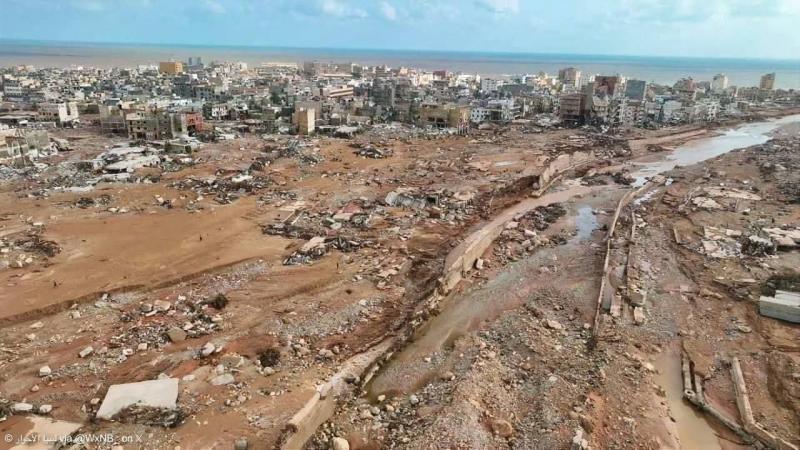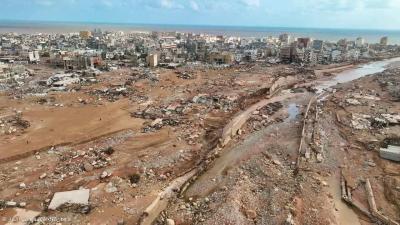The mayor of Derna, Abdul Menem Al-Ghaithi, predicted today, Wednesday, that the death toll in the Libyan city due to catastrophic flooding could reach between 18,000 and 20,000 based on the number of destroyed areas. Derna was particularly vulnerable to disasters after a decade of chaos. The city in eastern Libya was devastated when storm waters swept away two dams, flooding the city center early Monday and sweeping entire neighborhoods into the sea.
It remains unclear whether the deteriorating infrastructure or the decisions made by authorities contributed to the disaster and the massive loss of life, estimated in the thousands. However, the risks facing the city had been revealed long before the disaster. An academic who published research in 2022 stated that the recurrence of flooding threatens dams built in the wadi, which is usually a dry riverbed, calling for immediate maintenance.
Abdul Wanis Ashour, an expert in water sciences from Omar Al-Mukhtar University in Libya, wrote, "If a massive flood occurs, the result will be catastrophic for the residents of the valley and the city." Meanwhile, residents, who have long lost trust in any authority due to years of fighting and conflict, reported confusion about how to deal with the crisis when Storm Daniel inundated the area.
One resident, Mustafa Salem, told Reuters, "Some areas were instructed to evacuate, but some people did not respond," without mentioning the source of the instructions.
Libya has been without a government with authority covering the entire country since the 2011 uprising that deposed Muammar Gaddafi. Conflicting factions have divided the country, cities have competed against one another, and state funds have been squandered due to corruption. After 2014, the country was divided between two competing administrations, one in the east and the other in the west.
Libya remains politically divided despite a ceasefire since 2020 and some efforts to unify the country. Only a few places in Libya have escaped the conflict that has engulfed the entire country, but Derna has been particularly hard-hit by fighting since 2014 and the takeover by ISIS militants before they were subsequently driven out by rival jihadist groups.
Libyan analyst Jalil Harshaoui stated that when eastern Libyan forces (Libyan National Army) led by Khalifa Haftar took control of the city in 2019, many Derna residents claimed that the advancing forces punished both the jihadists and ordinary citizens of the city. The longstanding tense relationship between Derna residents and eastern Libya forces, and their leadership in Benghazi, was revealed when eastern authorities postponed local elections after reports of clashes between Haftar supporters and their opponents.
Harshaoui remarked, "Derna is seen in Benghazi as a source of problems."
**Divisions and Corruption**
The divisions across Libya have also contributed to Derna's problems. Foreign countries recognize the Government of National Unity in Tripoli, not the administration in the east chosen by the Libyan National Parliament in Benghazi. While various governments have official contacts with Haftar and the parliament in the east, Libya’s divisions mean that there are competing levels of officials dealing with matters across the country, including when it comes to sending aid.
However, some institutions operate across the political divide. The Central Bank of Libya in Tripoli pays civil servants' salaries and funds some government agencies in both the east and west, even during the height of the conflict. The 2020 ceasefire, following the latest major bout of fighting, lifted internal travel restrictions. Libyans can now drive or fly freely between Tripoli and Benghazi.
Nonetheless, eastern factions have long complained that they do not receive a fair share of the country's oil wealth. While the government in Tripoli has allocated state funds for some reconstruction projects, there is little evidence of development in the east.
The High Financial Committee, established this year with members from various political factions, aims to ensure equitable distribution of wealth. However, many ordinary Libyans believe that corruption will impede their access to the country's riches. Leaders of factions in Libya deny engaging in corrupt practices themselves, but they often accuse their rivals of the same.




